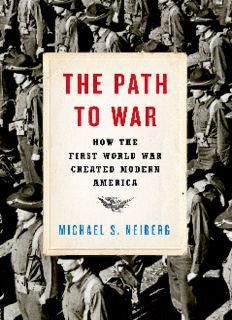
The path to war : how the First World War created modern America PDF
Preview The path to war : how the First World War created modern America
The Path to War • The PaTh to War • HoW THe FirsT World War CreaTed Modern aMeriCa Michael s. neiberg 1 1 oxford University Press is a department of the University of oxford. it furthers the University’s objective of excellence in research, scholarship, and education by publishing worldwide. oxford is a registered trade mark of oxford University Press in the UK and certain other countries. Published in the United states of america by oxford University Press 198 Madison avenue, new York, nY 10016, United states of america. © Michael s. neiberg 2016 all rights reserved. no part of this publication may be reproduced, stored in a retrieval system, or transmitted, in any form or by any means, without the prior permission in writing of oxford University Press, or as expressly permitted by law, by license, or under terms agreed with the appropriate reproduction rights organization. inquiries concerning reproduction outside the scope of the above should be sent to the rights department, oxford University Press, at the address above. You must not circulate this work in any other form, and you must impose this same condition on any acquirer. library of Congress Cataloging-in-Publication data names: neiberg, Michael s., author. Title: The path to war : how the First World War created modern america / Michael s. neiberg. description: new York : oxford University Press, 2016. | includes bibliographical references and index. identifiers: lCCn 2016006846 | isBn 9780190464967 subjects: lCsH: World War, 1914–1918—United states. | United states—Politics and government—1913-1921. Classification: lCC d619 .n45 2016 | ddC 940.3/73—dc23 lC record available at https://lccn.loc.gov/2016006846 1 3 5 7 9 8 6 4 2 Printed by sheridan Books, inc., United states of america contents • introduction: The road over There starts on a Commuter Train 3 1. Understanding the Two Germanys 9 2. a Cause Most Think is right 39 3. The impossible Middle 66 4. 1916 and the Wages of Guilt 95 5. no More Jerichos 122 6. election Year Politics and national defense: an insoluble dilemma 151 7. The Melting Pot, the War, and american identity 179 8. awaiting the overt act 206 Conclusion 231 acknowledgments 239 notes 243 index 287 v Theodore Roosevelt (left) and Richard Harding Davis together on Army maneu- vers. Davis was one of America’s most trusted war correspondents, having covered virtually every global conflict of his age. He became an important anti-German voice in 1914. Davis saw the German destruction of the Belgian university town of Louvain with his own eyes. He, like most Americans, saw Louvain as evidence of terrible war crimes committed by a dangerous German regime. Like Davis, “The American Agatha Christie,” Mary Roberts Rinehart, went to cover the war as a staunch neutral but soon became pro-Allied. She and Davis were both skeptical of British media accounts of German atrocities. Heavyweight boxing champion Jack Johnson was in Europe when the war began. He arrived in Paris to an ecstatic greeting because of his promise to donate his ve- hicles to the French Army. Harvard’s Danzig-born Hugo Münsterberg was one of Germany’s most eloquent defenders. But his views were out of step with those of Americans, even those of German descent.
Description: